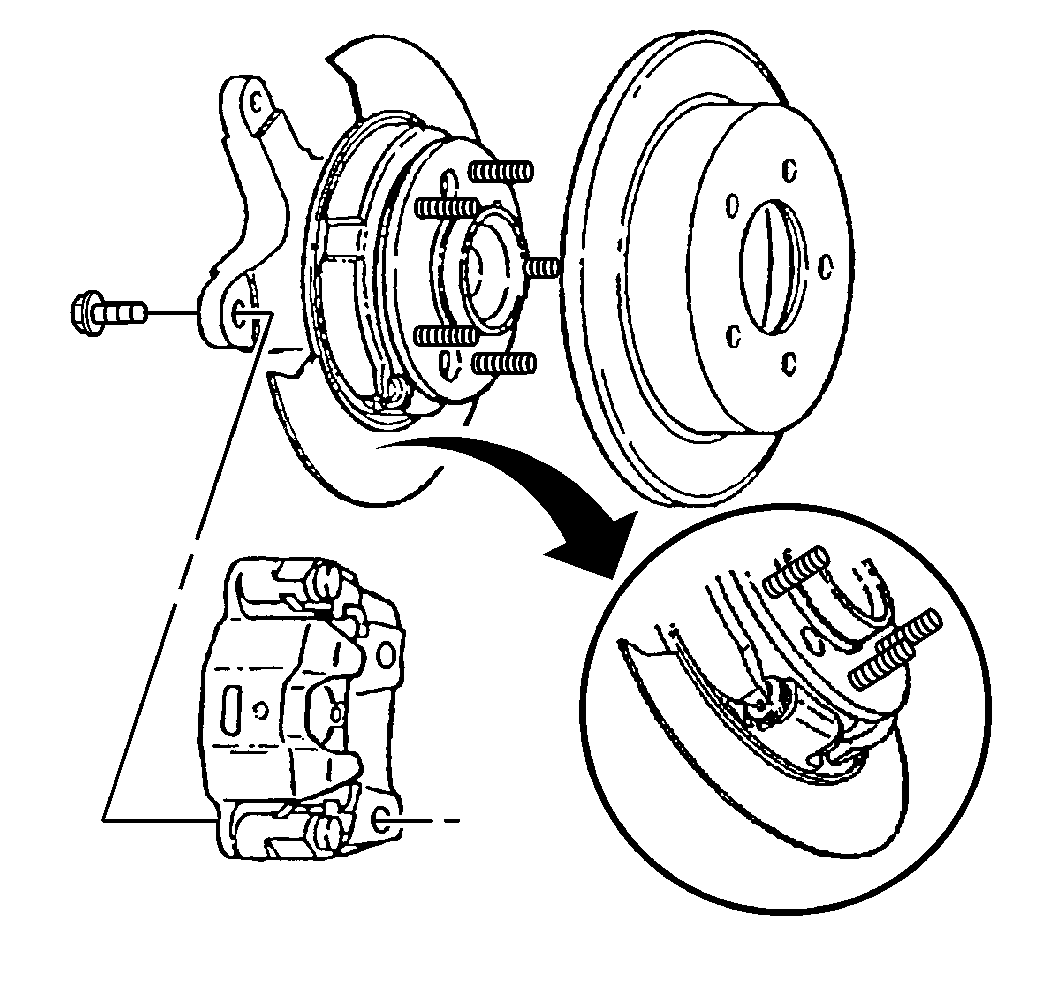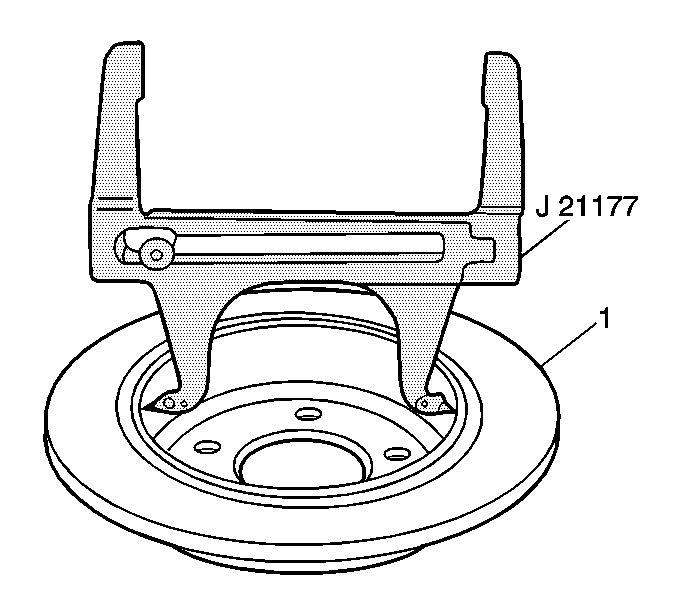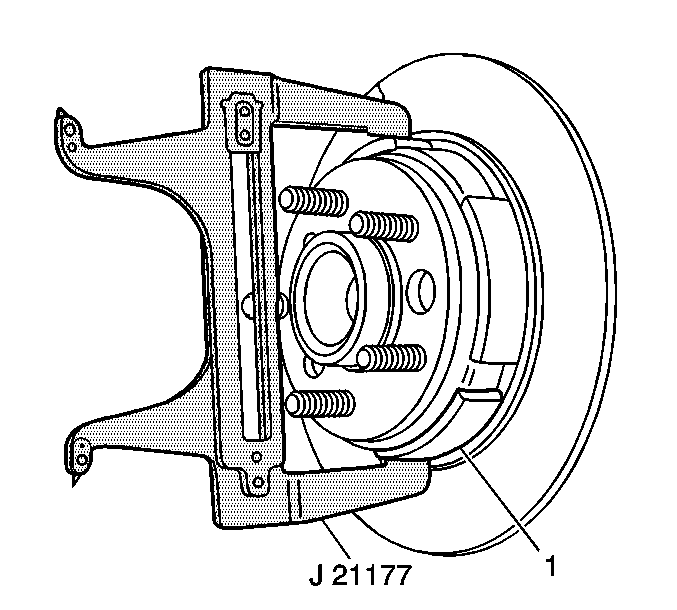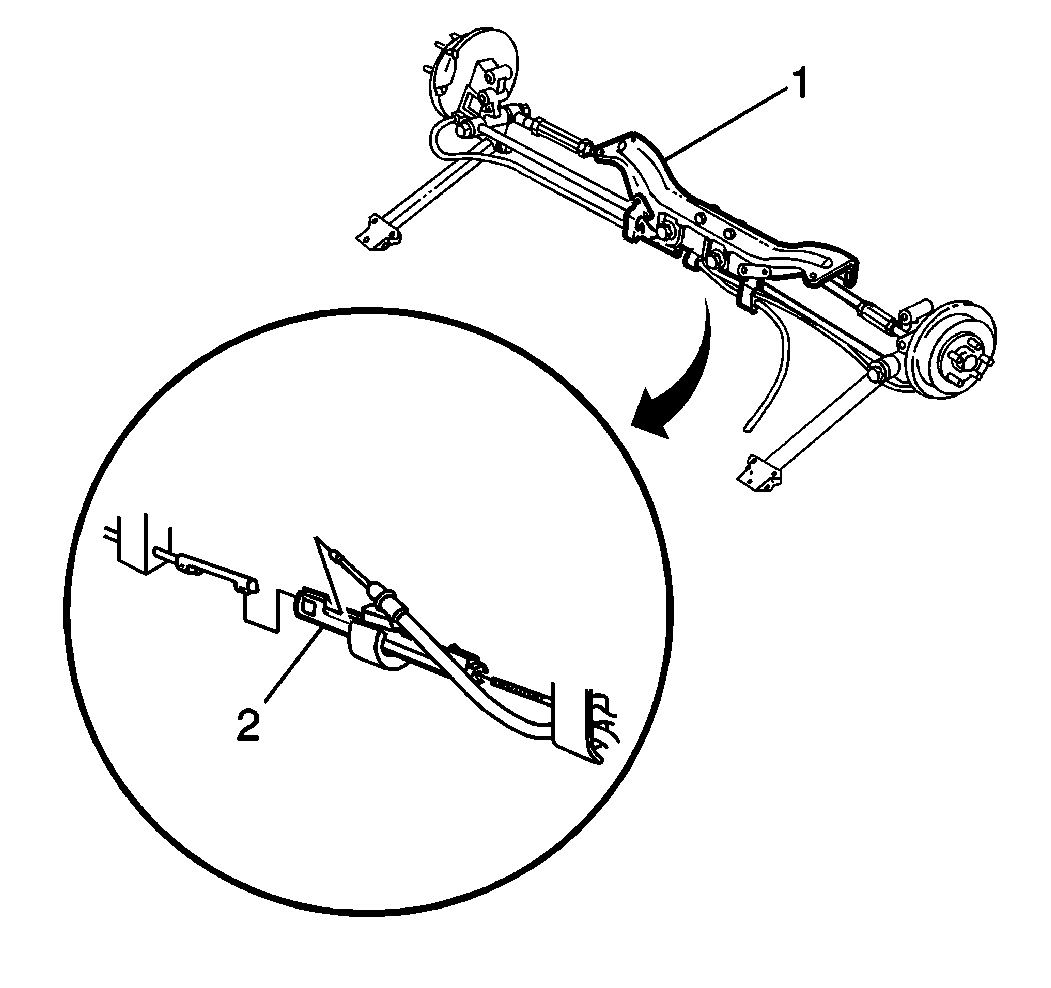For 1990-2009 cars only
Parking Brake Adjustment Disc Brake
Tools Required
J 21177-A Drum-to-Brake Shoe Clearance Gauge
Caution: Refer to Brake Fluid Irritant Caution in the Preface section.
Caution: Refer to Brake Dust Caution in the Preface section.
Notice: Refer to Brake Fluid Effects on Paint and Electrical Components Notice in the Preface section.
- Apply and fully release the parking brake 6 times.
- Verify that the parking brake pedal releases completely.
- Raise and suitably support the vehicle. Refer to Lifting and Jacking the Vehicle in General Information.
- Remove the rear wheels and tires. Refer to Tire and Wheel Removal and Installation in Tires and Wheels.
- Remove both rear caliper brackets. Refer to Rear Brake Caliper Bracket Replacement in Disc Brakes.
- Relieve tension on the park brake system at the park brake equalizer.
- Remove both rear brake rotors. Refer to Rear Brake Rotor Replacement in Disc Brakes.
- Set the J 21177-A inside of the park brake drum (1) at the widest point.
- Position the J 21177-A over the park brake shoe (1) at the widest point.
- Turn the adjuster on the actuator until the park brake shoe (1) just contacts the J 21177-A .
- Repeat steps 8-10 for the opposite side.
- Install both rear brake rotors. Refer to Rear Brake Rotor Replacement in Disc Brakes.
- Install both rear caliper brackets. Refer to Rear Brake Caliper Bracket Replacement in Disc Brakes.
- Install the rear wheels and tires. Refer to Tire and Wheel Removal and Installation in Tires and Wheels.
- Adjust the parking brake by turning the nut at the equalizer (2) while spinning both rear wheels. When either rear wheel starts to drag, back off the nut one full turn.
- Lower the vehicle to curb height.
- Apply the parking brake, then inspect for rotation of the rear wheels. If the rear wheels rotate during this inspection, readjust the parking brake shoes.
- Release the parking brake. Verify that the wheels rotate freely.
- Lower the vehicle.
| • | Turn ON the ignition. Verify that the BRAKE indicator lamp is off. |
| • | If the BRAKE indicator lamp is on, ensure the parking brake pedal is in release mode and fully returned to stop. Remove the slack in the front parking brake cable by pulling downward on the cable. |


| • | Place the contacts on the tool to the widest point of the drum (1). |
| • | Tighten the set screw on the tool to ensure the proper measurement when removing the tool from the drum (1). |


Parking Brake Adjustment Drum Brake
Caution: Refer to Brake Fluid Irritant Caution in the Preface section.
Caution: Refer to Brake Dust Caution in the Preface section.
Notice: Refer to Brake Fluid Effects on Paint and Electrical Components Notice in the Preface section.
- Apply and fully release the parking brake 6 times. Verify that the park brake pedal releases completely.
- Turn ON the ignition. Verify that the BRAKE indicator lamp is off.
- Raise and suitably support the vehicle. Refer to Lifting and Jacking the Vehicle in General Information.
- Remove the rear wheels and tires. Refer to Tire and Wheel Removal and Installation in Tires and Wheels.
- Adjust the drum brakes. Refer to Drum Brake Adjustment in Drum Brakes.
- Install the rear wheels and tires. Refer to Tire and Wheel Removal and Installation in Tires and Wheels.
- Adjust the park brake system by turning the nut at the equalizer (2) while spinning both rear wheels. When either rear wheel starts to drag, back off the nut one full turn.
- Lower the vehicle to curb height.
- Apply the park brake five clicks and check the forward rotation of the rear wheels. With five clicks applied it should be very difficult to turn the wheels by hand (should require 30 - 40N·m torque, measured with a torque wrench on a wheel stud). With less than five clicks applied, wheels should turn easily by hand. Readjust the equalizer nut as needed to obtain this condition.
- Release the parking brake. Verify the wheels rotate freely.
- Lower the vehicle.
If the BRAKE lamp is on, then check the following:
| • | Ensure the parking brake is in release mode and fully returned to the stop. |
| • | Check the front park brake cable slack. Remove the slack in the front park brake cable by pulling downward on the cable. |

